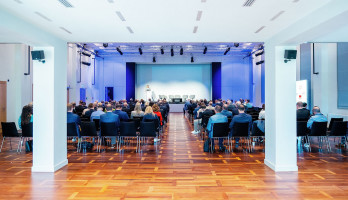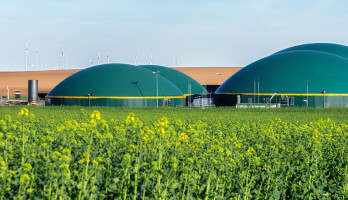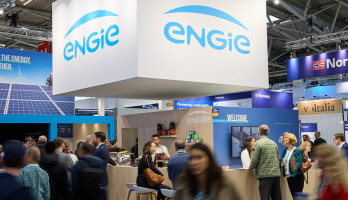
Economy up again, CO2 down further!
Climate hacks for the stimulus package
The economic stimulus package passed by the federal government a few weeks ago has historic dimensions. But does it also help to tackle the challenge of climate protection? Only to a limited extent, if you read the assessments made by experts so far. This is precisely why we must not bury our heads in the sand and should do our best to protect the climate and achieve the energy transition, comments Christian Noll, Managing Director of the German Enterprise Initiative for Energy Efficiency (DENEFF).
The Federal Government has allocated EUR 130 billion to counter the economic effects of the Corona crisis. The stimulus package is rightly of such historic proportions, as the pandemic has long since turned into a global economic crisis. The vocabulary used was also aggressive: Finance Minister Scholz wanted to bring out the "bazooka" for the "big bang". But is this also true of the sustainable transformation of our economy towards climate neutrality? Will the right course be set for achieving climate targets and a significant increase in energy efficiency, which is central to this?
Future package is a first step
Yes and no. After all, EUR 50 billion is going into Germany's "Future Package". Nearly 20 percent of this, however, is spent solely on building a hydrogen economy. However, this will probably not make a major contribution to the achievement of the 2030 climate targets. Fortunately, the funds for energy-focused building refurbishment have been increased by another two billion euros. That would have been necessary anyway, regardless of Corona. The programs improved by the climate package were in great demand in the first half of the year. The (re-)increase in applied energy research is also commendable. All this was far from self-evident, as at the beginning of the crisis some voices had called for climate protection to be put on the back burner for the time being. Unfortunately, these steps will not be sufficient in the medium and long term to achieve our climate targets safely. The Oeko-Institut, among others, has already stressed this.
More opportunities lie dormant in the details
However, on closer inspection, the economic stimulus package still conceals a number of programs which, although they do not sound directly like climate protection and energy efficiency when they are first read, could nevertheless leverage great potential if implemented wisely. That is why, in the coming months, it must be a matter of bringing these programs to life – ideally in a climate-friendly and energy-saving way. In concrete terms, for example, it is a question of almost 4 billion euros which should go to kindergarten, schools, sports facilities and social institutions. This is a good thing, because they are often dilapidated, obsolete and have far too high energy costs. In addition to climate protection, investments in civil society are also stimulated here. And: the public sector can finally fulfill its exemplary role prescribed in the Climate Protection Act. This is long overdue, as citizens would legitimately have to ask themselves why they should invest in energy efficiency when their children are attending crumbling schools every day.
The same applies to the promised digitalization push, which, however, will not be backed up with funds until the 2021 budget. This program represents a great opportunity to use Digitalization for the efficient energy transition. Concepts such as the energy-saving meter, smart buildings solutions for the intelligent balance of energy supply and demand need to be mainstreamed. Now the Federal Government has the opportunity to put in place good and user-oriented programs. And last but not least, a note: It doesn't always have to be the big "boom." Modern energy services, which can deliver guaranteed energy savings, are all too often hampered by regulatory obstacles. Removing these costs taxpayers nothing and could open up great potential in the industrial and building sectors.
Hacking the Climate Change Package
This short overview shows: The adoption is only the first step. However, in order to win the world championship in energy efficiency promised in the coalition agreement, the programs must now be rigorously aligned with the energy and climate targets and be made practical for the realization of the projects. They should therefore be "hacked" in the interests of climate protection and reducing energy consumption. Energy efficiency policy is climate policy – this also applies to the EU's Green Deal and the upcoming Energy Efficiency Roadmap of the Federal Ministry of Economics.
It is clear that it will be a marathon rather than a sprint. DENEFF has already run ahead and has started the Recoverthon. Under the motto "Economy goes up, CO2 stays down", we want to work together with practitioners and experts from business, society and science to develop intelligent "hacks" of how municipalities, companies and other actors implement the policy measures from the economic stimulus package in practice, in order to also advance the energy transition and climate protection. We are going to start on August 25th – and we would love to have you with us! Because: Doing is like wanting, only more rad!
Our Expert

DENEFF is an independent, cross-industry network of pioneering companies and organizations that advocates an ambitious and effective energy efficiency policy.









